unit 10 it’s a nice day,isn’t it练习(鲁教版七年级下)
unit10《it’saniceday,isn’tit》学案(鲁教版初一下)

unit10《it’saniceday,isn’tit》学案(鲁教版初一下)一. [话题](Topic)Small talk二.[重点词组](Key Phrases)1. look like 看起来像…2. by noon 到中午为止3. on the weekend 在周末4. look through 扫瞄5. wait in line 排队等候6. a ball game fan 球迷7. have a wonderful time 过得愉快8. on Saturday night 在周六晚上9. thank you so much for … 为…而专门感谢你10. be friendly to 对…友好11. feel like 感受像…12. part of …的一部分13. have a hard time doing… 做…时专门费劲14. come along 显现,发生15. enjoy doing 享受做…的乐趣16. be good at … 擅长于…17. help sb. with sth. 关心某人做某事help sb. (to) do sth.18. a lot easier 容易的多19. get along 相处20. be careful to do sth. 小心去做某事21. at least 至少22. at this time 现在三.[交际用语]1. It's a nice day, isn't it?今天是个好天气,不是吗?Yes, it is. 是。
2. You're Ben's sister, aren't you?你是的姐姐/妹妹,对吗?Yes, I am.是的,我是。
3. You love violin music, don’t you?你喜爱小提琴乐曲,对吗?Yes, I do. 是的,我喜爱。
四. [重点难点释义](Language Points)1. I hope so. 我期望如此。
八年级英语下册Unit 10 It’s a nice day, isn’t it单元随堂练习题(附答案)
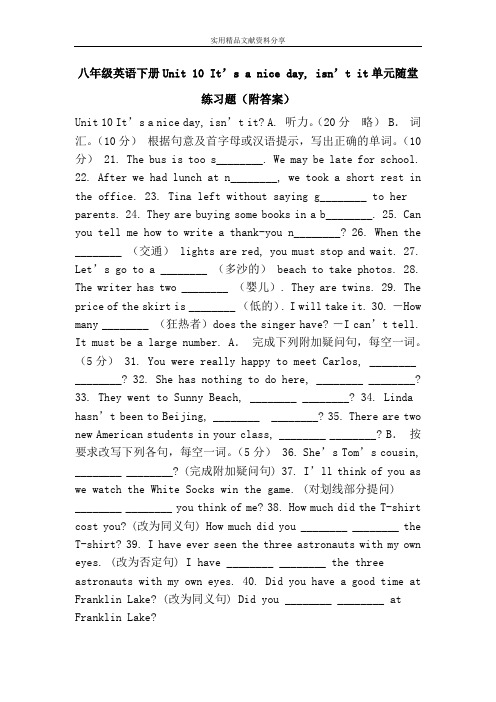
八年级英语下册Unit 10 It’s a nice day, isn’t it单元随堂练习题(附答案)Unit 10 It’s a nice day, isn’t it? A. 听力。
(20分略) B.词汇。
(10分)根据句意及首字母或汉语提示,写出正确的单词。
(10分) 21. The bus is too s________. We may be late for school.22. After we had lunch at n________, we took a short rest in the office. 23. Tina left without saying g________ to her parents. 24. They are buying some books in a b________. 25. Can you tell me how to write a thank-you n________? 26. When the ________ (交通) lights are red, you must stop and wait. 27. Let’s g o to a ________ (多沙的) beach to take photos. 28. The writer has two ________ (婴儿). They are twins. 29. The price of the skirt is ________ (低的). I will take it. 30. ―How many ________ (狂热者)does the singer have? ―I can’t tell. It must be a large number. A.完成下列附加疑问句,每空一词。
(5分) 31. You were really happy to meet Carlos, ________ ________? 32. She has nothing to do here, ________ ________?33. They went to Sunny Beach, ________ ________? 34. Linda hasn’t been to Beijing, ________________? 35. There are two new American students in your class, ________ ________? B.按要求改写下列各句,每空一词。
unit10it’sanicedayisn’tit单元测试鲁教版七年级下

Unit 10 It ' s a nice dayisn ' t ?姓名_________ 座号 ________ 班级__________i. 根据句意和首字母提示补全单词。
(10分)1. We use the e _______ to go up and dow n the buildi ng.2. look! It ' s raining outside, you ' d better put on your rain coat ortake an u _____ .3. If you want to know the answer to the problem, you should look t __________ books in the library.4. Would you like to comeand meet myparents and have a f __________ dinner with us?5. Whe n the t _______ lights are red, you must stop and wait.6. There is one child a ________ in the room.7. There are m _______ of reas ons for me to stay.8. We were filled with g _______ whe n we heard of his death.9. Yesterday Tomhad a birthday party and I had manywines with a delicatef ______ .10. The old men should be spoke n to p ___ .11. 将下列句子改为反意疑问句。
(15分)1. She is a school girl, _________ ?2. It looks like rain, ____________ ?3. They go there by bus, _________ ?4. His mother goes to work at 8:00, _________ ?5. The girl can sing an En glish song, _________ ?6. The stude nts had a class meeti ng yesterday, ________ ?7. He forgot his umbrella, ____________ ?8. There was a telepho ne for you, _________ ?9. Let ' s clean our bedroom, ?C. at firstD. at least10. I thi nk he is a teacher,you can.5. — How are you gett ing on with your work?Russia n at middle school. B. bit of D. little of the7. Childre n are sta nding _______ a nd gett ing on the bus. A. on lineB. i n a lineC. on a lineD. i n line8. You shouldn ' t wait here, _______________ y ou can go and ask Jim why. A. at the beg inningB. in the endIII.单项选择:(15 分)1. The foreig n visitors have been in Nartony forthree weeks.A. more tha nB. thanC. moreD. more and more2. I can swim skate. Will you please teach me? A. either •••orB. not only …but alsoC. both …andD. n either …nor3.—Can I try it on?A. sureB. be sureC. make sureD. surely4. —We are free this after noon. Let 's go to play computer games.—Well, I thi nk I'd better watch an English programA. tooB. eitherC. thenD. in stead—I can ' t do itany Ion ger, I'll have to get help.A. sin glyB. quietlyC. aloneD. hard6. I lear ned A. a bit C. a bit of9. The book is __________ . Most of the teachers are ________ in it.A. in terest ing, in terestedB. in teresti ng, in terest ingC. in terested, in teresti ngD. i nterested, i nterested10. Few of them hurt themselves in the accide nt last ni ght ,A. don ' t theyB. didn ' t theyC. did theyD. do theyIV. 补全对话:(10分)A: Hi, Kate! 1 ________B: Oh, I ' ve bee n to many places, such as Xi' an, Han gzhou, Shan ghai, Guili n and Tibet.A: 2 . ________B: Really? What places have you bee n to?A: Very few. I ' ve only been to Pingyao.B: 3 . _______A: It ' s in Shanxi. It ' s a small place, but it has a long history. It ' s one of the oldest tow ns in China. There you can see a well -kept city wall.B: 4 _____________ I ' ve just seen a lot of natural beauties, butnot much old Chinese culture (文化)yet.A: 5V. 完成句子:(10分)1. 看起来他的确赢了那场比赛。
Unit 10 It's a nice day ,isn't it 每课一练 (人教版八年级下) (2)
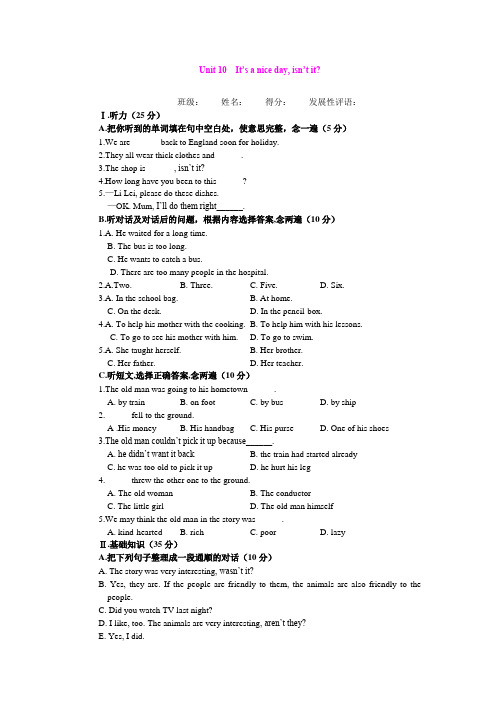
Unit 10 It’s a nice day,isn’t it?班级:姓名:得分:发展性评语:Ⅰ.听力(25分)A.把你听到的单词填在句中空白处,使意思完整,念一遍(5分)1.We are ______ back to England soon for holiday.2.They all wear thick clothes and______.3.The shop is ______, isn’t it?4.How long have you been to this______?5.—Li Lei, please do these dishes.—OK. Mum, I’ll do them right______.B.听对话及对话后的问题,根据内容选择答案,念两遍(10分)1.A. He waited for a long time.B. The bus is too long.C. He wants to catch a bus.D. There are too many people in the hospital.2.A.Two. B. Three. C. Five. D. Six.3.A. In the school bag. B. At home.C. On the desk.D. In the pencil-box.4.A. To help his mother with the cooking. B. To help him with his lessons.C. To go to see his mother with him.D. To go to swim.5.A. She taught herself. B. Her brother.C. Her father.D. Her teacher.C.听短文,选择正确答案,念两遍(10分)1.The old man was going to his hometown______.A. by trainB. on footC. by busD. by ship2.______fell to the ground.A .His money B. His handbag C. His purse D. One of his shoes3.The old man couldn’t pick it up because______.A. he didn’t want it backB. the train had started alreadyC. he was too old to pick it upD. he hurt his leg4.______threw the other one to the ground.A. The old womanB. The conductorC. The little girlD. The old man himself5.We may think the old man in the story was______.A. kind-heartedB. richC. poorD. lazyⅡ.基础知识(35分)A.把下列句子整理成一段通顺的对话(10分)A. The story was very interesting, wasn’t it?B. Yes, they are. If the people are friendly to them, the animals are also friendly to the people.C. Did you watch TV last night?D. I like, too. The animals are very interesting, aren’t they?E. Yes, I did.F. I don’t think so.I’m afraid of fight thrillers. I like funny stories.G. That’s true. I wish the animals and we will live in a friendly world.H. I don’t like funny stories. I like science. So I like to watch“Animal World”.1.______2.______3.______4.______5.______6.______7.______8.______B.圈出下列正确选项(10分)1.Your apartment is big,______(don’t you/isn’t it)?2.I like action movies. They’re exciting,______(are they/aren’t they)?3.Have you always gone to this school? No, ______(I haven’t/I didn’t).4.Are you waiting for the bus? Yes, ______(I’ve been waiting for two hours./I didn’t wait for it an hour ago.)5.It’s going to rain,______(isn’t it/is it)?6.You are going to Sandy Beach,______(aren’t we/aren’t you)?7.He isn’t going to have the concert tonight,______(isn’t he/is he)?8.—I hate rainy days.—______(So do I/So I do).9.The prices in this market are very______(high/expensive).10.Allen will come back______(by the noon/by noon).C.句型变换(10分)1.It’s very cold today.(变为反意疑问句)It’s very cold today, ______ ______?2.You gave me much help. I thank you.(两句合一句)Thank you ______ ______ me.3.Your apartment is quite comfortable.(变为反意疑问句)Your apartment is quite comfortable, ______ ______?4.I have taught in this school for one year.(改为同义句)I ______ to teach in this school ______ year.5.He told me. I got to school at seven today.(两句合一句)He said ______ got to school at seven ______ day.D.按括号中的汉语意思填空(5分)1.We had a______ ______(玩得开心)at the party last night.2.______do you______(认为……怎么样)of our school?3.If you______ ______(陪伴)me this afternoon, I will go with you tomorrow.4.Have you______(完成)your homework?______(如果)you have, please do some cleaning.5.You don’t like the comedy,______ ______(是吗)?Ⅲ.根据汉语提示完成句子(10分)1.You like thrillers, ______ ______ (是吗)?2.—Would you like something to drink?—Yes, please. I’d love ______ ______ (一点柠檬汁).3.Do you like ______ ______ (小提琴乐曲)?4.He has been ______ the ______ (练吉他)for a long time.5.—I usually take the taxi to school.—______ ______I(我也是).6.Rita, do you ______ an ______ (带雨伞)?It’s raining.7.It’s ______ ______ (真热)today, isn’t it?8.He likes playing soccer, ______ ______ (是吗)?9.Let’s go to the Water World, ______ ______ (好吗)?10.Don’ t stand too cl ose to everyone,______ ______(好吗)?Ⅳ.阅读理解(20分)ASkin-diving(潜泳)is a new sport today. This sport takes you into a wonderful new world. It is like a visit to the moon! When you are under water, it is easy for you to climb big rocks, because you are no longer heavy.Here, under water, everything is blue and green. During the day, there is plenty of light. When fish swim nearby, you can catch them with your hands.When you have tanks(罐)of air on your back, you can stay in deep water for a long time. But you must be careful when you dive in deep water.To catch fish is one of the most interesting parts of this sport. Besides, there are more uses for skin-diving. You can clean ships without taking them out of the water. You can get many things from the deep sea.Now you see that skin-diving is both useful and interesting.阅读短文,选择正确答案(10分)1.Skin-diving can take you to______.A. exciting worldB. new worldC. beautiful worldD. an interesting and new world2.This sport______.A. is like to travel on the moonB. is like to play on waterC. is like to visit a new countryD. is like to climb a big rock3.You can stay in deep water for a long time because______.A. you can swimB. you can skin diveC. you can bring something to eatD. you can take tanks of air with you4.Which of the following statements is NOT true?A. Skin-diving is a new sport.B. Skin-diving is like visiting the moon.C. The only use of skin-diving is to have more fun.D. Skin-diving is not only interesting but useful.5.Skin-diving is a useful and interesting sport because______.A. you can catch fish with your handsB. you can clean the ship in the waterC. you can get many things from the deep seaD. all of the aboveBWhen Billy was very small, he loved pictures. His mother often drew some for him on pieces of old paper. She was very bad at drawing, but Billy enjoyed her pictures and always wanted more.Then, when he was a little older, Billy’s mother gave him some pencils, and a drawingbook, and he began drawing pictures too, but they were never good.When Billy was five years old, his mother gave him a small black-board, some pieces of chalk, and a duster(揩布). He liked those very much. One day he was trying to draw a picture of his father on the blackboard. He drew lines and rubbed them out(擦去),drew more and rubbed those out too for ten minutes, but when he looked at his picture he was not happy.“Well,”he said at last to his mother,“I’ll put a tail on it and make it a monkey.”阅读短文,判断正(T)误(F)(10分)1.Billy’s mother wanted to draw better than his son.2.Billy began drawing pictures at the age of five.3.Billy’s mother was bad at drawing and Billy was bad at it, too.4.One day he tried to draw a picture of his father because he loved his father.5.He drew lines and rubbed them out because the picture on the blackboard wasn’t like hisfather at all.Ⅴ.写作训练(10分)选取你和你母亲之间发生的一件事情作为材料写一篇短文,这件事有可能是愉快的,也有可能是不愉快的,或印象深刻的,词数在80以上。
英语:Unit10 Unit 10 It is a nice day, isn’t it 教案(鲁教版七年级下)
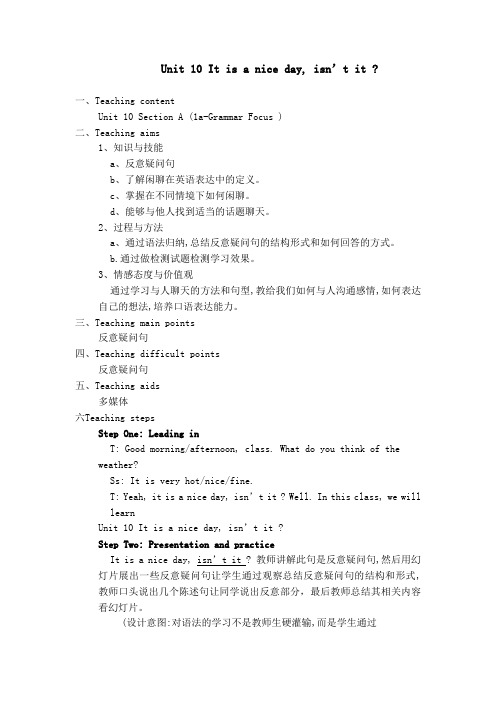
Unit 10 It is a nice day, isn’t it ?一、Teaching contentUnit 10 Section A (1a-Grammar Focus )二、Teaching aims1、知识与技能a、反意疑问句b、了解闲聊在英语表达中的定义。
c、掌握在不同情境下如何闲聊。
d、能够与他人找到适当的话题聊天。
2、过程与方法a、通过语法归纳,总结反意疑问句的结构形式和如何回答的方式。
b.通过做检测试题检测学习效果。
3、情感态度与价值观通过学习与人聊天的方法和句型,教给我们如何与人沟通感情,如何表达自己的想法,培养口语表达能力。
三、Teaching main points反意疑问句四、Teaching difficult points反意疑问句五、Teaching aids多媒体六Teaching stepsStep One: Leading inT: Good morning/afternoon, class. What do you think of the weather?Ss: It is very hot/nice/fine.T: Yeah, it is a nice day, isn’t it ? Well. In this class, we will learnUnit 10 It is a nice day, isn’t it ?Step Two: Presentation and practiceIt is a nice day, isn’t it ? 教师讲解此句是反意疑问句,然后用幻灯片展出一些反意疑问句让学生通过观察总结反意疑问句的结构和形式,教师口头说出几个陈述句让同学说出反意部分,最后教师总结其相关内容看幻灯片。
(设计意图:对语法的学习不是教师生硬灌输,而是学生通过语言练习观察和运用中自我总结,自我归纳,悟出语言归律,是一种自我习得的语言过程。
新目标八下英语Unit10Itsanicedayisntit单元测试题含答案

新目标八下英语Unit 10 It's a nice day,isn't it单元测试题(含答案)(时间:90分钟分值:100分)第Ⅰ卷听力部分(15分)Ⅰ.听句子,选择与其意思相符的图片(5分)1.______2.______3.______4.______5.______Ⅱ.听对话及问题,选择正确答案(5分)6.A.Her sister. B.Her mother. C.Nobody.7.A.It's cheap. B.Its price is low. C.It's expensive.8.A.English.B.M ath. C.Chinese.9.A.Ten minutes. B.Twenty minutes. C.Thirty minutes.10.A.Play cards with the woman.B.Buy an umbrella for his son.C.Send an umbrella to his son.Ⅲ.听短文,选择最佳选项(5分)11.Liang Tian held the party ______.A.to celebrate his success in the entrance examB.for his birthdayC.to relax himself12.Mr Xu may be a ______.A.student B.teacher C.driver13.Liang Tian will go the university by ______.A.bus B.train C.taxi14.Li Ming ______.A.failed the exam B.had an accident C.had a headache15.Mr Xu will go to ______.A.a party B.the station C.Li Ming's home第Ⅱ卷笔试部分(85分)Ⅳ.单项选择(10分)16.Look ______ the passage first,and then read it carefully.A.up B.through C.down D.at17.—Can I try it on?—I'm ______ you can.A.sure B.be sure C.make sure D.surely18.The reporter of CCTV4 said ______ 15 persons died in the fight in Kuwait.A.at least B.at less C.a few D.all19.You have never lost money before,______?A.don't you B.haven't you C.do you D.have you20.What a pity!He didn't ______ the Yellow River.A.cross B.past C.across D.through21.—I'm sorry,Mr Wu.I ______ my composition at home.—Don't forget ______ it here tomorrow,please.A.left;take B.forgot;to takeC.left;to bring D.forgot;bringing22.I don't like ______.I hope the sun will come out soon.A.rainy weather B.rains weatherC.a rainy weather D.rainy weathers23.—Which of the two dictionaries will you buy?—I'll buy ______ of them.So I can give one to my friend,Linda.A.both B.neither C.all D.either24.I like doing some shopping in this supermarket because the prices are usually very ______.A.low B.high C.cheap D.expensive25.Bob and Mike ______ well and they both like soccer very much.A.come along B.catch up C.get up D.get alongⅤ.完形填空(10分)In Britain,the weather is a common subject of conversation (谈话).“Isn't it a nice day?” “Do you think it__26__?” “I think it's going to snow.” People often __27__ a conversation __28__ these words.Many people think they can tell what the weather is going to be like.But they hardly agree with each other.One man m ay say, “Do you see __29__ in the east?It's going to rain tomorrow.” __30__ will say, “No,it's cloudy in the west.We are going to have fine weather tomorrow.”People often __31__ the weather they want.When a farmer needs water,he looks for something to tell himself,“It's going to rain.” He won't believe anything else.When friends have a picnic,they are __32__ the weather is going to clear up very quickly that they sit eating their lunch while it rains.Almost everyone __33__ what the weatherman will say.But he doesn't always __34__ what we want,and sometimes he makes mistakes.Still he usually comes __35__ to being correct (正确的) than anyone else.26.A.is rain B.will rain C.will rainy D.will be rain 27.A.set off B.make C.begin D.stop28.A.in B.by C.with D.for29.A.cloudy it is B.it is cloudy C.cloudy is itD.is it cloudy30.A.One man B.A man C.Other man D.Another man 31.A.look for B.look up C.look atD.ask for32.A.very sure B.sure enough C.so sureD.too sure33.A.hears B.listens C.hears from D.listens to34.A.ask us B.tell us C.speak us D.say to us 35.A.close B.closer C.closest D.the most closeⅥ.阅读理解(20分)AIn England,people often talk about the weather because they can experience (经历) four seasons in one day.In the morning the weather is warm just like in spring.An hour later black clouds come and then it rains hard.The weather gets a little cold.In the late afternoon the sky will be sunny,and the sun will begin to shine.It will be summer at this time of a day.In England,people can also have summer in winter,or have winter in summer.So in winter they can swim sometimes,and in summer sometimes they should take warm clothes.When you go to England,you will see that some English people usually take an umbrella or a raincoat with them in a sunny morning,but you should not laugh at them.If you don't take an umbrella or a raincoat,you will regret (后悔) later in the day.36.Why do people in England often talk about weather?A.Because they may have four seasons in one day.B.Because they often have very good weather.C.Because the weather is warm just like in spring.D.Because it is sunny all day.37.From the story we know that ______ come and then there is a heavy rain.A.sunshine and snow B.black cloudsC.summer and winter D.spring and autumn38.“People can also have summer in winter.” means “It is sometimes very ______ in winter.”A.warm B.cool C.cold D.rainy39.In a sunny morning some English people usually take an umbrella or a raincoat with them because ______.A.their friends ask them to do so B.it often rains in England C.they are going to sell them D.they are their favorite things 40.The best title (标题) for this passage is______.A.Bad Seasons B.Summer or WinterC.Weather in England D.Strange English PeopleBMrs Harris wanted to hold a big party.She was beginning to write the invitations when her husband saw that she was writing, “Party: 6:00 to 8:30 pm”.“That isn't v ery nice,is it?” he said.“You are telling our guests that they must go home at 8:30 pm.” So Mrs Harris just wrote, “Party: 6:30 pm”.A lot of guests came,and they all had a good time,so they didn't go home at 8:30 pm.In fact,they were still there at midnight when the door bell rang and a policeman arrived.He said,“You must stop making noise because someone has complained.”Mr Harris said he didn't want to quarrel (吵架) with the pol iceman,so everybodywent home.They were sorry to have to go.When Mr and Mrs Harris were alone again,she said to hi m, “That was a surprise,wasn't it?Who complained about the noise?”“I did,” Mr Harris answered in a tired voice.41.What didn't Mr Harris want Mrs Harris to do?A.To write the invitations.B.To write “6:30 p m” on the invitations.C.To write “8:30 pm” on the invitations.D.To hold the party.42.Mrs Harris didn't change the invitations,did she?A.Yes,she didn't. B.No,she did.C.Yes,she did. D.No,she didn't.43.Did they go home at 8:30 pm?A.Yes,all did. B.Yes,a few did.C.No,not all of them did. D.No,none did.44.Why did they go home at last?A.Because a policeman came to stop them.B.Because Mr Harris quarreled with a policeman.C.Because somebody came to complain.D.Because Mr Harris asked them to go home.45.Who telephoned to the police?A.A policeman. B.Someone. C.Nobody. D.Mr Harris.Ⅶ.任务型阅读(10分)What is small talk?It means that the conversation is about some little things,which are not important.You can make small talk when waiting in line in the supermarket,or while waiting for the bus.Though the topics in small talk are not important,the small talk itself is very important.It makes other people feel relaxed;it breaks the silence;it shows friendliness and good manners,and it makes time pass pleasantly.In small talk,it is important to remember to smile and keep the conversation relaxed.It's also good to show a sense of humor.You could talk about the weather,an interesting story in the news or on television,a sports event,a play or movie,or yo u could ask parents about their children.What shouldn't you talk about?You should try not to talk about politics or religion.Also,you should try not to talk too long on a subject or ask questions that are too personal.Give other people a chance to speak and listen to what they say.If you two have different opinions on a topic,change it.根据短文内容,回答下列问题。
unit 10 it’s a nice day,isn’t it教案1(鲁教版七年级下)
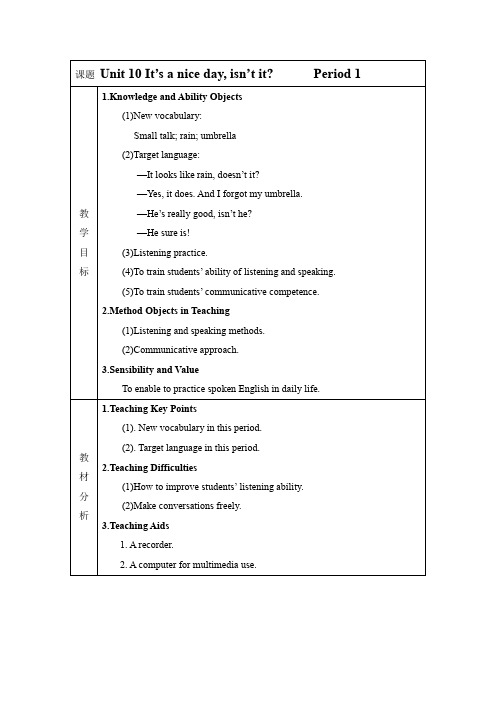
课题Unit 10 It’s a nice day, isn’t it? Period 1教学目标1.Knowledge and Ability Objects(1)New vocabulary:Small talk; rain; umbrella(2)Target language:—It looks like rain, doesn’t it?—Yes, it does. And I forgot my umbrella.—He’s really good, isn’t he?—He sure is!(3)Listening practice.(4)To train students’ ability of listening and speaking.(5)To train students’ communicative competence. 2.Method Objects in Teaching(1)Listening and speaking methods.(2)Communicative approach.3.Sensibility and ValueTo enable to practice spoken English in daily life.教材分析1.Teaching Key Points(1). New vocabulary in this period.(2). Target language in this period.2.Teaching Difficulties(1)How to improve students’ listening ability.(2)Make conversations freely.3.Teaching Aids1. A recorder.2. A computer for multimedia use.板书设计示意框图Unit 10 It’s a nice day, isn’t it?A list of places: parkbus stopcinemashoplift…时序Teaching ProceduresStep Ⅰ Greetings and RevisionGreet the class as usual and check the homework.Step II New wordsShow the new words on the screen and teach the new words.Ask students to read the new words first. Then correct the pronunciation. Teach the new words and ask students to repeat. Make sure students can understand the meanings.Step III Section A 1aThis activity introduces several examples of small talks.Show each picture on the screen and ask different students to say what is happening in each picture.T: Look at the pictures. Can you tell me what’s happening in each picture?S1: In Picture a, many people are waiting in line to buy tickets.S2: In Picture b, so many people are at the subway station. It’s already nine o’clock, but the train isn’t here. They are very worried.S3: The boy and the man are waiting for the train in Picture c.S4: In the last picture, we can see some persons listening to the concert.T: Very good. In all pictures, two people who don’t know each other are startinga conversation. Can you tell me other places where we would talk topeople we don’t know?S5: On the bus, in the lift.S6: In the park, at the bus stop.…Call on a student to write his/her list of places on the board. Ask other students to add places to this list. Let students discuss the completed list.Step IV 1bActivity 1b gives students practice in understanding the target language in spoken conversation. In this activity ask students to listen and number thepictures (2-4). Play the recording for twice. Students write the number ofeach conversation in the box next to the correct picture. Then check theanswers.Answers:Picture a: Conversation 2Picture b: no matchPicture c: Conversation 3Picture d: Conversation 1Tapescript:Conversation 1Girl 1: He’s really good, isn’t he?Girl 2: He sure is! I come to all his concerts.Girl 1: Do you have his new CD?Girl 2: Yes, I do.Conversation 2Girl 3: This line is moving slowly, isn’t it?Woman: Yes, it is. We’ve been here for 20 minutes already.Girl 3: I hope the movie is good.Woman: So do I. Do yo u think it’s going to rain?Girl 3: I hope not!Woman: Me, too.Conversation 3Boy: The train is late, isn’t it?Man: No, today is Sunday. The trains only run twice an hour on weekdays.Boy: Oh, I didn’t know that. I usually take th e train on weekdays.Step V 1c PairworkThis activity provides guided oral practice using the target language.Ask students to look at the pictures on the screen one by one. Get students towork in pairs. Make their own conversations about the people in the pictures.As students talk, move around the room checking their work.Sample conversation:A: You love violin music, don’t you?B: Yes. What about you?A: Me, too. / So am I.Step VI SummaryT:This class we’ve learned some new words and the target language. In the United States, people who don’t know each other often start conversation in public places. This small talk can help people feel more comfortable. In some places, especially in small cities and towns, people feel it is polite to speak with people they don’t know. Do you often have small talks with people you don’t know? If you have small talks with people in English, I think you can improve your spoken English greatly.Step VII HomeworkT: Write down the sentences in activity 1c in your exercise books.教学后记课题Unit 10 It’s a nice day, isn’t it? Period 2教学目标1.Knowledge and Ability Objects(1)New vocabulary:Noon; Franklin lake; on the weekend(2)Target language:—It’s really cold today, isn’t it?—Yes, it is. I hope the bus comes soon.(3)Listening practice.(4)To train students’ ability of listening and speaking.(5)To train students’ ability of communication.2.Method Objects in Teaching(1)Listening and speaking methods.(2)Communicative approach.3.Sensibility and ValueTo enable to understand the feelings of others in communication.教材分析1.Teaching Key Points(1). Key phrases: by noon; on the weekend; I hope so.(2). Master the structures in Grammar Focus.2.Teaching DifficultyMake conversations using the target language in Grammar Focus.3.Teaching Aids1. A recorder.2. A computer.板书设计示意框图Unit 10 It’s a nice day, isn’t it?successful / unsuccessfulHe is a good student, isn’t he?Li Ping likes music, doesn’t he? You take this bus, don’t you? No, I don’t.Yes, I do.时序Teaching ProceduresStep Ⅰ Greetings and RevisionGreet the class as usual and check the homework. Ask students to show their written work.Step II New wordsShow the new words on the screen and teach the new words.Step III 2aActivity 2a provides guided listening practice using the target language.First write successful and unsuccessful on the board.T: Do you know what’s the meaning of the word “ successful”?S1: Yes. I think it means “ having done well”.T: Great. What about the word “unsuccessful”?Ss: We are not sure.T: It means “not successful”. Clear?Ss: Yes.T: To have successful small talks, both people need to ask questions. Now listen to the three conversations. Are they examples of successful orunsuccessful small talks? Write “a” or “u” in the blanks.Play the recording the first time. Students only listen.Then play it a second time. This time students write “s” or “u” in the blanks.Check the answers.Answers:Conversation 2: u Conversation 3: sTapescriptConversation 1Boy 1: hate waiting for the bus.Girl 1: So do I.Boy 1: I’m going to be late to school.Girl 1: So am I.Conversation 2Man 1: These shirts are really expensive, aren’t they?Woman 1: Yes, they are.Man 1: The prices in this store are too high.Woman 1: Yes, they are.Conversation 3Girl 2: It always rains on the weekend, doesn’t it?Boy 2: Yes. It rains every Saturday! Do you think it’ll stop by noon?Girl 2: I hope so. I want to go swimming.Boy 2: Oh? Where do you swim?Girl 2: At Franklin Lake. Do you ever go there?Step IV 2bT: Listen to conversation 3 again. Put the sentences and questions in order. First I’ll ask different students to read the lines of the conversation to you. Thesample answer “f” is gi ven. This is the opening line of the conversation.Play the recording. Ask students to write the letter of each line of conversation in the correct place.Check the answers.Answers:1. f2. b3. e4. a5. d6.c7. gStep V 2c PairworkThis activity provides guided oral practice using the target language.T: First I’ll ask a pair of students to read the conversation in Activity 2b.Sa: It always rains on the weekend, doesn’t it?Sb: Yes. It rains every Saturday.Sa: Do you think it’ll stop by noon?Sb: I hope so. I want to go swimming.Sa: Oh? Where do you swim?Sb: At Franklin Lake.Sa: Do you ever go there/(Write two phrases and a sentence on the board: on the weekend; by noon; Ihope so.)T: In the conversation, there are two important phrases and a key structure.Please look at the board, “on the weekend” means “on Saturday and onSunday” and “I hope so” means “I hope it will stop by noon”. Pleaseremember them. Now practice the conversation in pairs.(After a while)T: OK. Now it’s your turn to make your own small talks. You can use the questions in the box.As students talk to each other, move around the room checking their work.In the end ask several pairs to come to the front of the room and say their conversations to the class.Step V Grammar FocusReview the grammar box. Ask students to read the questions and answers. Ask students to copy the three sets of questions and answers in their exercise books.Then show the following on the screen.It’s really windy today, isn’t it?Yes, it is.You’re Ben’s sister, aren’t you?Yes, I am.The No. 15 bus stops here, doesn’t it?Yes, it does.Step VI Grammar NotePoint out that tag questions are a simple, direct way to start a conversation. Because tag questions ask for a short answer (Yes, I do. No, it isn’t.), they are easy to answer and give two people who don’t know each other a comfortable way to start talking.Step VII SummaryT:This class we’ve learned what one says to start a small talk. I hope you can start a small talk with strangers. In this way you can practice your spoken English and make a lot of friends.Step VIII HomeworkT: Tape record yourselves as you read your conversations for Activity 2c.教学后记课题Unit 10 It’s a nice day, isn’t it? Period 3教学目标1.Knowledge and Ability Objects(1)New vocabulary:Have a good day; look through; bookstore; elevator; cross; low; slow; sandy(2)Target language:Their prices are really low, aren’t they?This line is slow, isn’t it?Nice day, isn’t it?(3)Writing practice.(4)To train students’ writing ability.(5)To train students’ communicative compete nce.2.Method Objects in Teaching(1)Writing method.(2)Communicative approach.3.Sensibility and ValueTo enable to understand the feelings of others in communication.教材分析1.Teaching Key PointsMaster the target language in this period.(1). Have a good day!(2). Look through;(3). Nice day, isn’t it?2.Teaching DifficultiesMake conversations freely.3.Teaching Aids1. A computer.2. A tape recorder.3. Some pictures.板书设计示Unit 10 It’s a nice day, isn’t it?Their prices are r eally low, aren’t they? This line is slow, isn’t it?Nice day, isn’t it? = It’s a nice day, isn’t it?意框图Look through; wait in line; wait to do sth.; cross a … street时序Teaching ProceduresStep Ⅰ Greetings and RevisionGreet the class as usual and check the homework.Ask students to place the tapes and the tape recorder where students in the class can listen to each other’s conversations during free time.Step II New wordsShow the new words on the screen. Teach the new words.Ask students to read the new words first and then correct the pronunciation. Have students read for several times.Step III 3aThis activity provides reading and writing practice using the target language.(Show a picture on the screen.)T: Look at the picture. Where are they?Ss: They are at the bus stop.T: Yes. They are having a small talk while they are waiting for buses. Now let’s look at their conversation. In it there are four blanks. You need to fill inthem. First please think of answers that would be correct in blank 1.S1: I’m going to the beach.S2: I always go to the beach on hot days.T: Correct. Very good. Then finish writing sentences in the blanks on your own.Ask some students to say their sentences to the class.In the end invite some students to read their completed conversations to theclass.Write some of the new sentences students use on the board and discuss the sentences with the class.Step IV 3b PairworkActivity 3b provides writing and speaking practice using the target language.First show the conversation in 3a on the screen and ask students to read it.A: This is great weather, isn’t it?B: It sure is. But it’s a little hot for me.A: Oh, I love hot weather. I’m going to the beach today.B:Which beach are you going to?A: I’m going to Today Beach. Where do you usually go?B: I usually go to Sandy Beach.A: Is it very crowded?B: No, it’s never crowded. Well, ha ve a good day!A: Thanks. Goodbye.B: Goodbye.T: Look at the conversation on the screen. Read it together.Ss: …(Show the situations on the screen while students are reading.)·Two people looking through books in a bookstore.·Two people waiting in line to buy ice cream.·Two people alone in an elevator.·Two people waiting to cross a busy street.(Write the questions on the board.)·Their prices are really low, aren’t they?·This line is slow, isn’t it?·Nice day, isn’t it? (= It’s a nice day, isn’t it?)T: Please read the situations together.Ss: …T: Do you know the meanings of the underlined phrases?S3: “look through” means “read quickly”.S4: “Wait in line” means “wait in a row of people”.…(Write the phrases on the board.)T: Now please write a new conversation together using your own ideas. You can use the situations on the screen. And the questions on the board can helpyou.As they make their own conversation, move around the room offering assistance as needed.In the end of this activity ask pairs of students to say their conversations for the class. Step V An ActivityHow Long Can You Talk?Divide the class into several teams of four to five students each. Ask each team to write down a list of opening questions they might use to start aconversation. Then ask sets of two teams to work together. One team givesan opening question. The other team must give an answer and then follow itup with a question to the first team. The first team then answers and tries toask another question. The two teams continues the conversation this way aslong as possible.Step VI 4 GroupworkThis activity provides guided oral and writing practice using the targetlanguage.First show students some pictures ( a student, a farmer, an old man and abusinessman).Ask students to identify the people.Then ask students to give sample topic of conversation. Topics should besuitable for each person.Have students work in groups and role play the conversation.Ask a few students to share the conversations with the rest of the class.Step VI SummaryT:This class we’ve done some writing practice. We know how to start a small talk with different people.Step VII HomeworkWrite the conversations in Activity 3b in your exercise books.教学后记课题Unit 10 It’s a nice day, isn’t it? Period 4教学目标1.Knowledge and Ability Objects(1)New vocabulary:Have a good day; look through; bookstore; elevator; cross; low; slow; sandy(2)Target language:Their prices are really low, aren’t they?This line is slow, isn’t it?Nice day, isn’t it?(3)Writing practice.(4)To train students’ writing abil ity.(5)To train students’ communicative competence.2.Method Objects in Teaching(1)Writing method.(2)Communicative approach.3.Sensibility and ValueTo enable to understand the feelings of others in communication.教材分析1.Teaching Key PointsMaster the target language in this period.(1). Have a good day!(2). Look through;(3). Nice day, isn’t it?2.Teaching DifficultiesMake conversations freely.3.Teaching Aids1. A computer.2. A tape recorder.3. Some pictures.板书设计示意框图Unit 10 It’s a nice day, isn’t it?Their prices are really low, aren’t they?This line is slow, isn’t it?Nice day, isn’t it? = It’s a nice day, isn’t it?Look through; wait in line; wait to do sth.; cross a … street时序Teaching ProceduresStep Ⅰ Greetings and RevisionGreet the class as usual and check the homework.Ask students to place the tapes and the tape recorder where students in the class can listen to each other’s conversations during free time.Step II New wordsShow the new words on the screen. Teach the new words.Ask students to read the new words first and then correct the pronunciation. Have students read for several times.Step III 3aThis activity provides reading and writing practice using the target language.(Show a picture on the screen.)T: Look at the picture. Where are they?Ss: They are at the bus stop.T: Yes. They are having a small talk while they are waiting for buses. Now let’s look at their conversation. In it there are four blanks. You need to fill inthem. First please think of answers that would be correct in blank 1.S1: I’m going to the beach.S2: I always go to the beach on hot days.T: Correct. Very good. Then finish writing sentences in the blanks on your own.Ask some students to say their sentences to the class.In the end invite some students to read their completed conversations to the class.Write some of the new sentences students use on the board and discuss the sentences with the class.Step IV 3b PairworkActivity 3b provides writing and speaking practice using the target language.First show the conversation in 3a on the screen and ask students to read it.A: This is great weather, isn’t it?B: It sure is. But it’s a little hot for me.A: Oh, I love hot weather. I’m going to the beach today.B:Which beach are you going to?A: I’m going to Today Beach. Where do you usually go?B: I usually go to Sandy Beach.A: Is it very crowded?B: No, it’s never crowded. Well, have a good day!A: Thanks. Goodbye.B: Goodbye.T: Look at the conversation on the screen. Read it together.Ss: …(Show the situations on the screen while students are reading.)·Two people looking through books in a bookstore.·Two people waiting in line to buy ice cream.·Two people alone in an elevator.·Two people waiting to cross a busy street.(Write the questions on the board.)·Their prices are really low, aren’t they?·This line is slow, isn’t it?·Nice day, isn’t it? (= It’s a nice day, isn’t it?)T: Please read the situations together.Ss: …T: Do you know the meanings of the underlined phrases?S3: “look through” means “read quickly”.S4: “Wait in line” means “wait in a row of people”.…(Write the phrases on the board.)T: Now please write a new conversation together using your own ideas. You can use the situations on the screen. And the questions on the board can helpyou.As they make their own conversation, move around the room offering assistance as needed.In the end of this activity ask pairs of students to say their conversations for the class.Step V An ActivityHow Long Can You Talk?Divide the class into several teams of four to five students each. Ask each team to write down a list of opening questions they might use to start aconversation. Then ask sets of two teams to work together. One team givesan opening question. The other team must give an answer and then follow itup with a question to the first team. The first team then answers and tries toask another question. The two teams continues the conversation this way aslong as possible.Step VI 4 GroupworkThis activity provides guided oral and writing practice using the targetlanguage.First show students some pictures ( a student, a farmer, an old man and abusinessman).Ask students to identify the people.Then ask students to give sample topic of conversation. Topics should besuitable for each person.Have students work in groups and role play the conversation.Ask a few students to share the conversations with the rest of the class.Step VI SummaryT:This class we’ve done some w riting practice. We know how to start a small talk with different people.Step VII HomeworkWrite the conversations in Activity 3b in your exercise books.教学后记课题Unit 10 It’s a nice day, isn’t it? Period 5教学目标1.Knowledge and Ability Objects(1)New vocabulary:cost; yeah(2)Target language:—You are Jenny’s friend, aren’t you?—Yes, I am.—This is a great party, isn’t it?—Yes, it is.(3)Listening practice.(4)To train students’ ability of listening and speaking.(5)To train students’ communicative competence.2.Method Objects in Teaching(1)Listening and speaking methods.(2)Communicative approach.3.Sensibility and ValueTo be interested in taking part in all kinds of activities in an English class.教材分析1.Teaching Key Points(1). Key structure:—This is a great party, isn’t it?—Yes, it is.(2). Listening practice.2.Teaching DifficultiesRole play a small talk freely.3.Teaching Aids1. A tape recorder.2. A computer.板书设计示意框图Un it 10 It’s a nice day, isn’t it?—This is a great party, isn’t it?— Yes, it is.时序Teaching ProceduresStep Ⅰ Greetings and RevisionGreet the class as usual and check the homework. Ask students to show their written work.Step II New wordsLearn the new words.First show the new words on the screen. Teach the new words. Ask students to read for several times.Step III Section B 1aThis activity helps students understand what topics are good or not good in small talk situations.Focus attention on the four pictures. Point to the pictures one by one. Ask a student to read the question under each picture to the class.Then have students check the questions that they think are good small talk questions.Ask students to discuss their answers.The first and third pictures should be checked.Step IV An ActivityGood or Bad?Ask students to choose small talk topics and make lists of good and bad small talk questions about each topic. For example, if the topic is clothing, a badquestion would be, That shirt was expensive, wasn’t it? A good questionwould be, You bought that shirt at the new store downtown, didn’t you?Give students time to write questions for a topic they choose. Then havestudents read their sentences to the class, and have the other students callout Good or Bad after each statement.Step V 1b PairworkActivity 1b provides guided oral practice using the target language.Look at the sample conversation in this activity and ask two students to read it to the class.Sa: Do you like thrillers?Sb: No, but I love comedies.T: Thank you. OK, now work with your partner. Make your own conversations about the people in Activity 1a.As students talk, move around the room checking their work.Step VI 2aThis activity gives students practice in understanding the target language in spoken conversation.T: Now you’ll hear three conversations. The people in each conversation are in a different place. Write your answers in these spaces. (Point out the space andthe sample answer.) For example, The people in conversation 1 are at aparty.Then play the recording for students.Check the answers.Conversation 2: at schoolConversation 3: at a ball gameTapescriptConversation 1Woman 1: You’re Jenny’s friend, aren’t you?Girl 1: Yes, I am. My name is Rita. And you’re Jenny’s mom, aren’t you?Woman 1: That’s right. So tell me about yourself, Rita. Do you play any sports?Girl 1: Yes, I do. I like sports. I play tennis and ping-pong. And I love swimming.Woman 1: That’s great. Would you like something to drink?Girl 1: Yes, please. I’d love some lemonade.Conversation 2Boy 1: You’re new here, aren’t you?Boy 2: Yes, I am. My name’s Bill. You’re Tony, aren’t you?Boy 1: That’s right. What do you think of the school?Boy 2: It’s great. Have you always gone to this school?Boy 1: No, I haven’t. I started here last year.Conversation 3Boy 3: It’s really crowded, isn’t it?Boy 4: Yes, it is. Are you a ball game fan?Boy 3: Yes, I am. Say, did you see the game on TV Friday night?Boy 4: Yeah! It was really exciting, wasn’t it?Step VII 2bThis activity provides listening practice using the target language.Tell students this time they are going to match each question with the correct answer.Then point out the sample answer. Students read the sample question and answerthemselves.Play the recording.Students write the letter in correct blank.Stop the recording after each line or two to give students a chance to finish writing in their books.Then check the answers with the whole class.Step VIII 2c PairworkThis activity provides oral practice using the target language.T: Look at the openers in the box. Read them together.Ss: …( While students reading, teacher write the second one on the board.)T: Pay attention to the second one. In it, “isn’t this” isn’t used. Instead, “isn’t it”is used.Clear?Ss: Yes.T: Now make your own small talk conversations in pairs using the openers. The sample conversation is given. Please read it first.As they work, move around the room checking progress and offering help as needed.Ask several pairs to say their completed conversations for the class.Step IX SummaryT:This class we’ve had some listening and speaking practice using the target language. I hope all of you take an active part in the activities in class. In this way you can improve your spoken English.Step X HomeworkT: Preview the new words in the next page.教学后记。
Unit 10 It's a nice day ,isn't it 每课一练 (人教版八年级下) (3)
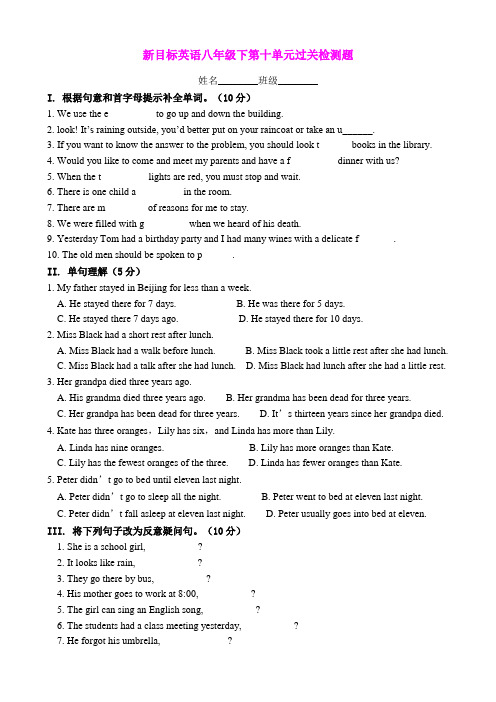
新目标英语八年级下第十单元过关检测题姓名________班级________I. 根据句意和首字母提示补全单词。
(10分)1. We use the e_________ to go up and down the building.2. look! It’s raining outside, you’d better put on your raincoat or take an u______.3. If you want to know the answer to the problem, you should look t______ books in the library.4. Would you like to come and meet my parents and have a f_________ dinner with us?5. When the t_________ lights are red, you must stop and wait.6. There is one child a_________ in the room.7. There are m________ of reasons for me to stay.8. We were filled with g ________ when we heard of his death.9. Yesterday Tom had a birthday party and I had many wines with a delicate f_______.10. The old men should be spoken to p______.II. 单句理解(5分)1. My father stayed in Beijing for less than a week.A. He stayed there for 7 days.B. He was there for 5 days.C. He stayed there 7 days ago.D. He stayed there for 10 days.2. Miss Black had a short rest after lunch.A. Miss Black had a walk before lunch.B. Miss Black took a little rest after she had lunch.C. Miss Black had a talk after she had lunch.D. Miss Black had lunch after she had a little rest.3. Her grandpa died three years ago.A. His grandma died three years ago.B. Her grandma has been dead for three years.C. Her grandpa has been dead for three years.D. It’s thirteen years since her grandpa died.4. Kate has three oranges,Lily has six,and Linda has more than Lily.A. Linda has nine oranges.B. Lily has more oranges than Kate.C. Lily has the fewest oranges of the three.D. Linda has fewer oranges than Kate.5. Peter didn’t go to bed until eleven last night.A. Peter didn’t go to sleep all the night.B. Peter went to bed at eleven last night.C. Peter didn’t fall asleep at eleven last night.D. Peter usually goes into bed at eleven.III. 将下列句子改为反意疑问句。
八年级英语Unit10.Itsaniceday,isntit试题

人教版八年级英语〔下〕标注[特约]制卷人:打自企;成别使;而都那。
审核人:众闪壹;春壹阑;各厅……日期:2022年二月八日。
Unit10. It’s a nice day , isn’t it?一、重点、难点、考点解析Section A.1、He sure is. 他确实很好。
〔1〕、句中sure 是副词,意为“确实,当然之前,是HY的俗语说法。
例如:It sure was very cold. 天确实很冷。
He sure is a good man. 他确实是个好人。
〔2〕、sure 作形容词,意为“确信的,有把握的;可靠的〞例如:I think she’s coming , but I’m not quite sure.我想她会来的,但我不太肯定。
be sure of 与be sure to do 区别:be sure of 主语是人,主语感到“有把握,确信〞be sure to do 主语可以是人也可以是物,表示说话人推测“一定,必然会〞例如:I’m sure of that. 我确信那件事。
Be sure to write and give me all your news. 一定要写信告诉我你的消息。
〔3〕、be sure that 意为“确信,确定〞。
例如:I’m sure that he will come. 我确信他要来。
2、I hope so. 我希望如此。
在简单答语中,hope 可以与so 和not 连用,可以说I hope so 或者I hope not, 但不可以像I don’t think so 那样说I don’t hope so.例如:①、——Can he finish the work today? 他今天能完成工作吗?——I hope so . 我希望他能完成。
②、——He is angry with me, isn’t it? 他生我气了,对吗?----I hope not. 我希望不是那么一回事。
unit 10 it’s a nice day,isn’t it测试题b卷(鲁教版七年级下)
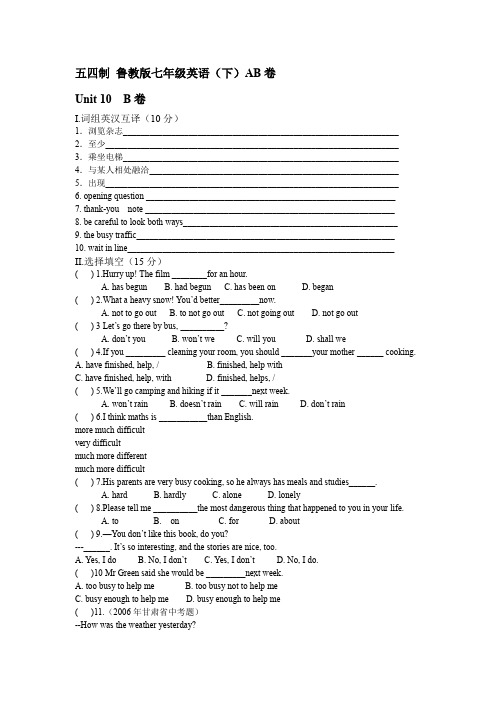
五四制鲁教版七年级英语(下)AB卷Unit 10 B卷I.词组英汉互译(10分)1.浏览杂志_______________________________________________________________ 2.至少___________________________________________________________________ 3.乘坐电梯_______________________________________________________________ 4.与某人相处融洽_________________________________________________________ 5.出现___________________________________________________________________6. opening question _________________________________________________________7. thank-you note _________________________________________________________8. be careful to look both ways_________________________________________________9. the busy traffic___________________________________________________________10. wait in line_____________________________________________________________II.选择填空(15分)( ) 1.Hurry up! The film ________for an hour.A. has begunB. had begunC. has been onD. began( ) 2.What a heavy snow! You’d better_________now.A. not to go outB. to not go outC. not going outD. not go out( ) 3 Let’s go there by bus, __________?A. don’t youB. won’t weC. will youD. shall we( ) 4.If you _________ cleaning your room, you should _______your mother ______ cooking.A. have finished, help, /B. finished, help withC. have finished, help, withD. finished, helps, /( ) 5.We’ll go camping and hiking if it _______next week.A. won’t rainB. doesn’t rainC. will rainD. don’t rain( ) 6.I think maths is ___________than English.more much difficultvery difficultmuch more differentmuch more difficult( ) 7.His parents are very busy cooking, so he always has meals and studies______.A. hardB. hardlyC. aloneD. lonely( ) 8.Please tell me __________the most dangerous thing that happened to you in your life.A. toB. onC. forD. about( ) 9.—You don’t like this book, do you?---______. It’s so interesting, and the stories are nice, too.A. Yes, I doB. No, I don’tC. Yes, I don’tD. No, I do.( )10 Mr Green said she would be _________next week.A. too busy to help meB. too busy not to help meC. busy enough to help meD. busy enough to help me( )11.(2006年甘肃省中考题)--How was the weather yesterday?--It was terrible. It rained _______all day.A. stronglyB. heavilyC. hardlyD. badly( )12.(2005年江西省中考题)--Hi, Sam, we are going for a walk. Would you like to_________?--Great! Let’s go!A. come alongB. come onC. come outD. come up( )13.(2006年山西省中考题)You’d better_________the word in a dictionary if you don’t know its meaning.A. look overB. look upC. look after( )14.(2006年济南市改实验区中考题)Liu Xiang is a super star, ___________?A. is heB. isn’t heC. does heD. doesn’t he( )15.(2006年长沙市中考题)---When did your father come back last night.---He didn’t come back _______he finished all the work.A. untilB. whileC. ifIII.以所给词的正确形式填空(10分)I live on the ____________(twenty) floor. So I usually use the elevator ________(go) up and down. In the morning, I go downstairs at six o’clock and go outside ________(buy) a newspaper. Then I walk to the bus stop. Usually I’ll wait for the bus with a few people, because it’s early. Then I will __________(have) small talks with them. We often talk about the weather since we don’t know each other. After __________(get) on the bus, I open the newspaper. I usually use just a few minutes _________(look) through the newspaper. If I can find something_______ (interest), I will read it _________(careful) . Then I get off the bus and get into my office. There are five people in my office, I am always the first ________(arrive). We _________(get) along well with each other.IV.句子改错,找出下列句子中错误的一项(10分)( )1. I forget to close the window but I remember to close it yesterday evening. __________A B C D( )2. I am too tired and I decide to stop having a rest. _____________A B C D( )3.If you don’t know how to use the world , please look it through. ______________A B C D( )4. Their prices are really low, are they?._______________A B C D( )5. Writing the book spent me a lot of time.________________A B C DV.句型转换(10分)写出下列句子的反意疑问句.1.Don’t open the door of the bedroom, __________________?2.There was a lot of rain in Beijing yesterday,___________________?3.Let us go to sports camp together,__________________?4.He has to eat some junk food for supper, ____________________?5.I am going to the Great Wall for vacation, ____________________?6.They can hardly understand what I said, _______________________?7.He was unhappy, ____________________?8.They had a wonderful time in my birthday party, ____________________?9.My father has never been to the lake, ______________________?10.I found she could find nothing in her room, ______________________?VI.翻译下列句子(15分)1.尽管我是这个班的新学生,可是我感觉好象就是这个班的一部分。
七年级英语下册:Unit 10 It s a nice day, isn t it同步练习(鲁教版)
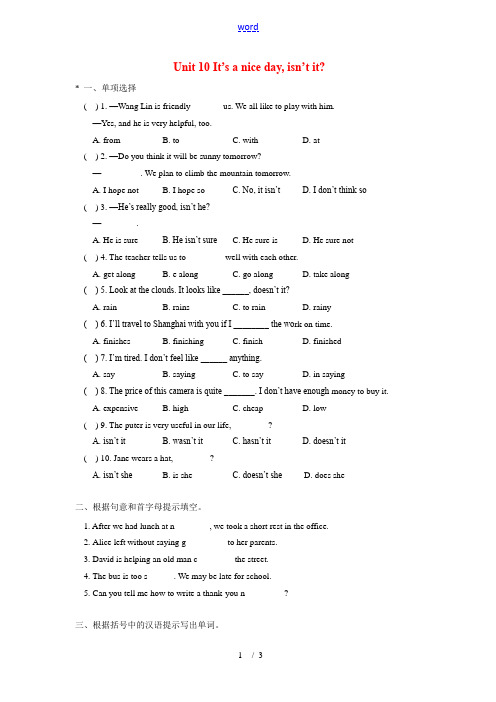
Unit 10 It’s a nice day, isn’t it?* 一、单项选择( ) 1. —Wang Lin is friendly _______us. We all like to play with him.—Yes, and he is very helpful, too.A. fromB. toC. withD. at( ) 2. —Do you think it will be sunny tomorrow?—_________. We plan to climb the mountain tomorrow.A. I hope notB. I hope soC. No, it isn’tD. I don’t think so ( ) 3. —He’s really good, isn’t he?—________.A. He is sureB. He isn’t sureC. He sure isD. He sure not( ) 4. The teacher tells us to ________ well with each other.A. get alongB. e alongC. go alongD. take along( ) 5. Look at the clouds. It looks like ______, doesn’t it?A. rainB. rainsC. to rainD. rainy( ) 6. I’ll travel to Shanghai with you if I ________ the wo rk on time.A. finishesB. finishingC. finishD. finished( ) 7. I’m tired. I don’t feel like ______ anything.A. sayB. sayingC. to sayD. in saying( ) 8. The price of this camera is quite _______. I don’t have enough money to buy it.A. expensiveB. highC. cheapD. low( ) 9. The puter is very useful in our life, ________?A. isn’t itB. wasn’t itC. hasn’t itD. doesn’t it( ) 10. Jane wears a hat, ________?A. isn’t sheB. is sheC. doesn’t sheD. does she二、根据句意和首字母提示填空。
unit10《it’saniceday,isn’tit》测试题a卷(鲁教版初一下)
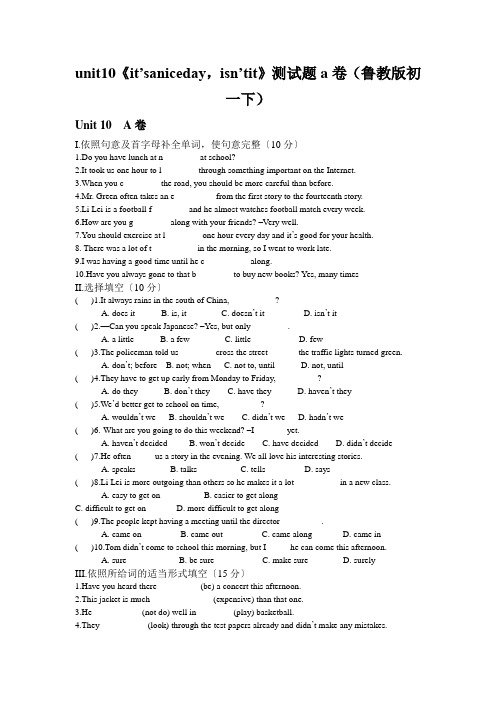
unit10《it’saniceday,isn’tit》测试题a卷(鲁教版初一下)Unit 10 A卷I.依照句意及首字母补全单词,使句意完整〔10分〕1.Do you have lunch at n ________at school?2.It took us one hour to l ________through something important on the Internet.3.When you c ________the road, you should be more careful than before.4.Mr. Green often takes an e _________from the first story to the fourteenth story.5.Li Lei is a football f ________and he almost watches football match every week.6.How are you g ________along with your friends? –Very well.7.You should exercise at l________ one hour every day and it’s good for your health.8. There was a lot of t__________ in the morning, so I went to work late.9.I was having a good time until he c__________ along.10.Have you always gone to that b ________to buy new books? Yes, many timesII.选择填空〔10分〕( )1.It always rains in the south of China, __________?A. does itB. is, itC. doesn’t itD. isn’t it( )2.—Can you speak Japanese? –Yes, but only ________.A. a littleB. a fewC. littleD. few( )3.The policeman told us ________cross the street ______ the traffic lights turned green.A. don’t; beforeB. not; whenC. not to, untilD. not, until( )4.They have to get up early from Monday to Friday, _________?A. do theyB. don’t theyC. have theyD. haven’t they( )5.We’d better get to school on time, _________?A. wouldn’t weB. shouldn’t weC. didn’t weD. hadn’t we( )6.-What are you going to do this weekend? –I _______yet.A. haven’t decidedB. won’t decideC. have decidedD. didn’t decide ( )7.He often _____us a story in the evening. We all love his interesting stories.A. speaksB. talksC. tellsD. says( )8.Li Lei is more outgoing than others so he makes it a lot__________ in a new class.A. easy to get onB. easier to get alongC. difficult to get onD. more difficult to get along( )9.The people kept having a meeting until the director _________.A. came onB. came outC. came alongD. came in( )10.Tom didn’t come to school this morning, but I _____he can come this afternoon.A. sureB. be sureC. make sureD. surelyIII.依照所给词的适当形式填空〔15分〕1.Have you heard there__________(be) a concert this afternoon.2.This jacket is much ______________(expensive) than that one.3.He ___________(not do) well in ________(play) basketball.4.They___________(look) through the test papers already and didn’t make any mistakes.5.After_________(cross) the street, he found an airport in front of them.6.Thanks for _________(look) after my sister while I was _______(go) away from home to shop.7.He really had a hard time ___________(finish) this difficult job.8.It was really boring, ________________(be not) is ? –Yes, it is a little_________(bored).9.There’s usually a lot of _________(traffic) at this time of day.i hates _____(drive) on the road.10.He asked the policeman for help, _________(do) he? No, he didn’t He found his car by ____________(him)IV.依照汉语意思完成以下句子〔15分〕1.刚才我在网上扫瞄了一下关于野营的信息。
unit 10《it’s a nice day,isn’t it》学案(鲁教版七年级下).doc

Unit 10 It’s a nice day, isn’t it?一. [话题](Topic)Small talk二.[重点词组](Key Phrases)1. look like 看起来像…2. by noon 到中午为止3. on the weekend 在周末4. look through 浏览5. wait in line 排队等候6. a ball game fan 球迷7. have a wonderful time 过得愉快8. on Saturday night 在周六晚上9. thank you so much for … 为…而非常感谢你10. be friendly to 对…友好11. feel like 感觉像…12. part of …的一部分13. have a hard time doing… 做…时很费劲14. come along 出现,发生15. enjoy doing 享受做…的乐趣16. be good at … 擅长于…17. help sb. with sth. 帮助某人做某事help sb. (to) do sth.18. a lot easier 容易的多19. get along 相处20. be careful to do sth. 小心去做某事21. at least 至少22. at this time 此时三.[交际用语]1. It's a nice day, isn't it?今天是个好天气,不是吗?Yes, it is. 是。
2. You're Ben's sister, aren't you?你是的姐姐/妹妹,对吗?Yes, I am.是的,我是。
3. You love violin music, don’t you?你喜欢小提琴乐曲,对吗?Yes, I do. 是的,我喜欢。
四. [重点难点释义](Language Points)1. I hope so. 我希望如此。
Unit 10 It’s a nice day, isn’t it_ 同步练习 4
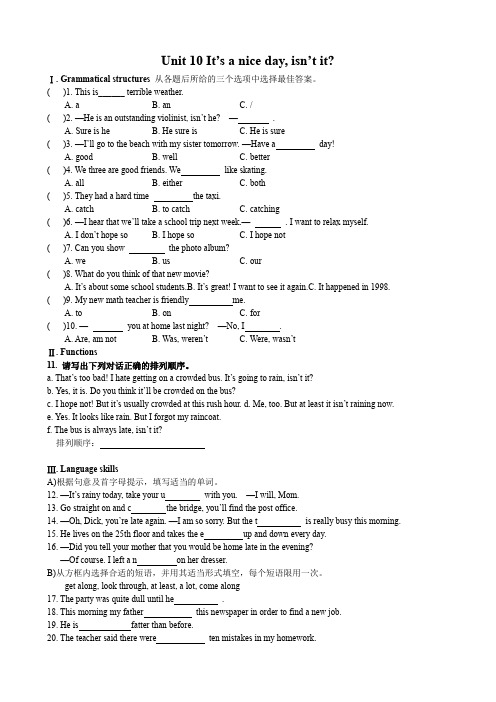
Unit 10 It’s a nice day, isn’t it?Ⅰ. Grammatical structures 从各题后所给的三个选项中选择最佳答案。
( )1. This is______ terrible weather.A. aB. anC. /( )2. —He is an outstanding violinist, isn’t he?— .A. Sure is heB. He sure isC. He is sure( )3. —I’ll go to the beach with my sister tomorrow.—Have a day!A. goodB. wellC. better( )4. We three are good friends. We like skating.A. allB. eitherC. both( )5. They had a hard time the taxi.A. catchB. to catchC. catching( )6. —I hear that we’ll take a school trip next week.— . I want to relax myself.A. I don’t hope soB. I hope soC. I hope not( )7. Can you show the photo album?A. weB. usC. our( )8. What do you think of that new movie?A. It’s about some school students.B. It’s great! I want to see it again.C. It happened in 1998. ( )9. My new math teacher is friendly me.A. toB. onC. for( )10. —you at home last night? —No, I .A. Are, am notB. Was, weren’tC. Were, wasn’tⅡ. Functions11. 请写出下列对话正确的排列顺序。
英语:鲁教版 七下Unit 10 It’s a nice day, isn’t it Period2(共16张)

二、结构:
陈述句 + 简短附加疑问句
1. 前肯+后否。
You are good at singing, aren’t you?
2. 前否+后肯。
It isn’t a nice day, is it?
三、 基本特点:
1. 前后两部分时态,人称和数必须一致。
It looks like rain, doesn’t it? He doesn’t need to work so late, does he?
(7)Let’s go to school early, ______ ____? shall we (8)Mary can speak little English , _____ can _____? she (9)Nothing is wrong with the watch, ____ is ____? it
Exercise
Exercise
①The boy is Japanese, ______he? isn't ②The book isn't interesting, ______ it? is ③He knows a lot about English names, doesn't ______ he? ④The girl doesn't like apples, ______ does she? ⑤There are two birds in the tree, ______ aren't there? ⑥The man came to China last month, ______ didn't he?
(4)She can hardly hear the words, can ___ she ___?
- 1、下载文档前请自行甄别文档内容的完整性,平台不提供额外的编辑、内容补充、找答案等附加服务。
- 2、"仅部分预览"的文档,不可在线预览部分如存在完整性等问题,可反馈申请退款(可完整预览的文档不适用该条件!)。
- 3、如文档侵犯您的权益,请联系客服反馈,我们会尽快为您处理(人工客服工作时间:9:00-18:30)。
Unit 10 It's a nice day, isn't it?I. 根据句意和首字母提示补全单词。
(10分)1. We use the e_________ to go up and down the building.2. look! It’s raining outside, you’d better put on your raincoat or take an u______.3. If you want to know the answer to the problem, you should look t______ books in the library.4. Would you like to come and meet my parents and have a f_________ dinner with us?5. When the t_________ lights are red, you must stop and wait.6. There is one child a_________ in the room.7. There are m________ of reasons for me to stay.8. We were filled with g ________ when we heard of his death.9. Yesterday Tom had a birthday party and I had many wines with a delicatef_______.10. The old men should be spoken to p______.II. 将下列句子改为反意疑问句。
(15分)1. She is a school girl, __________?2. It looks like rain, ____________?3. They go there by bus, __________?4. His mother goes to work at 8:00, __________?5. The girl can sing an English song, __________?6. The students had a class meeting yesterday, __________?7. He forgot his umbrella, _____________?8. There was a telephone for you, ___________?9. Let’s clean our bedroom, ______________?10. I think he is a teacher, ___________?III. 单项选择:(15分)1. The foreign visitors have been in Nartony for _________ three weeks.A. more thanB. thanC. moreD. more and more2. I can _________ swim _______ skate. Will you please teach me?A. either …orB. not only…but alsoC. both …andD. neither …nor3. -Can I try it on?-I’m ____________ you can.A. sureB. be sureC. make sureD. surely4. -We are free this afternoon. Let’s go to play computer games.-Well, I think I’d better watch an English program ________.A. tooB. eitherC. thenD. instead5. -How are you getting on with your work?-I can’t do it _________ any longer, I’ll have to get help.A. singlyB. quietlyC. aloneD. hard6. I learned _________ Russian at middle school.A. a bitB. bit ofC. a bit ofD. little of the7. Children are standing ________ and getting on the bus.A. on lineB. in a lineC. on a lineD. in line8. You shouldn’t wait here, ____________ you can go and ask Jim why.A. at the beginningB. in the endC. at firstD. at least9. The book is __________. Most of the teachers are _________ in it.A. interesting, interestedB. interesting, interestingC. interested, interestingD. interested, interested10. Few of them hurt themselves in the accident last night , __________.A. don’t theyB. didn’t theyC. did theyD. do theyIV. 补全对话:(10分)A: Hi, Kate! 1B: Oh, I’ve been to many places, such as Xi’an, Hangzhou, Shanghai, Guilin and Tibet.A: 2 .B: Really? What places have you been to?A: Very few. I’ve only been to Pingyao.B: 3 .A: It’s in Shanxi. It’s a small place, but it has a long history. It’s one of the oldest towns in China. There you can see a well-kept city wall.B: 4 I’ve just seen a lot of natural beauties, but not much old Chinese culture (文化)yet.A: 5 .V. 完成句子:(10分)1. 看起来他的确赢了那场比赛。
It ______ that he _________ that match.2. 他昨天告诉了我一些关于汤姆的一些事。
He _______ me something ________ Tom yesterday.3. 做班里拔尖学生不容易。
It isn’t ___________ the top students in the class.4. 谢谢你邀请我参加你的聚会。
___________ me _________ your party.5. 中国人对外国朋友很友好。
Chinese ___________ always _________ foreign guests.6. 你能帮我搬这个大盒子吗?_______ you _____ me __________ the heavy box?7. 我们学校至少有1500名同学。
_______ are _______ 1500 students in our school.8. 你和你的朋友们相处的如何?________ are you _________ your friends?9. 昨天我们举办了家宴。
Yesterday we __________10. 我写完所有作业之后才开始看电视。
I ________ until I ___________ all my homework.VI. 完形填空:(15分)Fire can help people in many ways. But it can also be very harmful (有害的). Fire can keep your house 1 , give light and cook food. But fire can burn things2 . Big fire can burn, trees, houses, animals or people.Nobody knows how people began to use fire. But there are 3 interesting old stories about how a man or woman started a fire. One is 4 a man. The man 5 a very long time ago. He went up the sun and 6 fire down.Today people know how to make a fire with matches (火柴). Children sometimes 7 to play with them. But matches can be very dangerous. One match can burn a piece of paper. and 8 it could burn a house. A small fire can turn a big fire. very quickly. So you 9 be careful with matches.Be careful with fire, and it will 10 you. But if you aren’t careful with fire. and it may hurt you.1. A. warm B. warmer C. cool D. cooler2. A. also B. too C. either D. neither3. A. many B. much C. little D. no4. A. over B. about C. a little D. no5. A. worked B. studied C. learned D. lived6. A. bring B. take C. brought D. took7. A. enjoy B. like C. don’t like D. become8. A. after B. late C. yet D. then9. A. can B. man C. will D. must10. A. help B. do C. tell D. hopeVII. 阅读短文,然后回答下面的问题。
